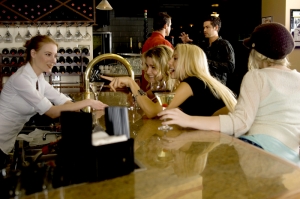 We here at TAM® of Nevada like to promote alcohol awareness and responsible drinking year round. However, we’re happy to help spread the message that April is Alcohol Awareness Month, sponsored by the Substance Abuse and Mental Health Services Administration. This is an opportunity to raise awareness of alcohol abuse and encourage people to make healthy, safe life choices.
We here at TAM® of Nevada like to promote alcohol awareness and responsible drinking year round. However, we’re happy to help spread the message that April is Alcohol Awareness Month, sponsored by the Substance Abuse and Mental Health Services Administration. This is an opportunity to raise awareness of alcohol abuse and encourage people to make healthy, safe life choices.
Drinking too much alcohol can lead to health problems, including alcohol poisoning, hangovers, and an increased risk of heart disease. 3 in 10 adults drink at levels that put them at risk for alcoholism, liver disease, and other problems, and nearly 18 million Americans have alcoholism or related problems (NIAAA). These are “sobering” numbers that heighten the role that servers and sellers have in protecting their communities.
This April, during Alcohol Awareness Month, TAM® of Nevada encourages you to take this time to educate yourself about the dangers of alcohol abuse. Good judgment and knowledge of the Techniques of Alcohol Management (TAM) ® are crucial qualities in a service professional; and Alcohol Awareness Month is an opportunity for you to showcase your training.
Alcohol abuse is a dangerous problem. This month, reflect on your own habits and those of your patrons. Do you recognize the signs of alcohol abuse and binge drinking in yourself or others? You can learn more about the dangers of alcoholism in hospitality workers by reading our blog ‘Warning – Hospitality Workers May Be at Risk for Alcohol Abuse,” and learn more about spotting binge drinkers by reading out blog, “Beware of Binge Drinkers.”
If you recognize a drinking problem in yourself, a loved one, or a customer, it is time to take action by making changes in your life, or making suggestions to others on ways to get help. The National Institute on Alcohol Abuse and Alcoholism has published a helpful guide titled, “How to Cut Down on Your Drinking,” to help you form an action plan to tackle the problem. Some of their tips to cut down include:
- Avoid temptation at home. By keeping little or no alcohol around at home, you won’t be tempted to overindulge.
- Learn how to say no. It may not be easy to be around other people who are drinking without imbibing yourself, but learning how to politely, but firmly say no can be empowering. You should let people know you’re trying to cut back or quit, and stay away from anyone who pushes you to drink.
- Keep busy with other activities. Find a hobby or activity that you enjoy and focus your energy on staying active doing something that doesn’t involve drinking.
Finally, remember one should never be afraid to ask for the help they need. One can ask for help from a friend, family member or doctor if necessary. How will you promote safe choices and alcohol awareness this month?
Resources
- Substance Abuse and Mental Health Services Administration
- Rethinking Drinking – NIAAA
- How to Cut Down on Your Drinking – NIAAA
- National Health Observances – Healthfinder.gov
© 2011 National Hospitality Institute®, TAM® of Nevada


 Servers, bartenders and anyone else responsible for service and sale of alcoholic beverages has a very important job on their hands… knowing how to spot an inebriated guest, and knowing when to intervene. As a server, it’s important to make sure that your guests and patrons are having an enjoyable time, are served exactly what they ordered, and remain respectful of the establishment and others. On top of all of this, it’s imperative to watch for any warning signs that they may be intoxicated. As such, a bartender or server should always be closely monitoring their guests.
Servers, bartenders and anyone else responsible for service and sale of alcoholic beverages has a very important job on their hands… knowing how to spot an inebriated guest, and knowing when to intervene. As a server, it’s important to make sure that your guests and patrons are having an enjoyable time, are served exactly what they ordered, and remain respectful of the establishment and others. On top of all of this, it’s imperative to watch for any warning signs that they may be intoxicated. As such, a bartender or server should always be closely monitoring their guests.
